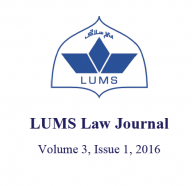
It gives us great pleasure to present the 3rd Volume of the LUMS Law Journal, which is the product of our correspondence and collaboration over the past year with the esteemed scholars published in these pages. In addition to the Articles and Case Notes sections, we have added two new sections containing Legislative Reviews and Book Reviews. It continues to be a busy year for the Parliament, the Provincial Assemblies and the Superior Courts, and several important jurisprudential developments have taken place, some of which shall be dissected in the pages to follow.
This Volume contains three articles, five case notes, two legislative reviews, and two book reviews.
Dr. Shahbaz Ahmad Cheema’s article examines the approach of Pakistani courts with regard to the admissibility and evaluation of DNA evidence. It also highlights some of the problems in the current approaches towards using DNA evidence, and attempts to propose solutions to overcome those problems so that crimes can be investigated in an optimal manner.
Hamza Hameed’s article attempts to explain the reasons for which the privatization of service providers in the aviation industry is essential for increasing competition between players within national markets. The author sheds light on how the lack of privatization results in an anti-competitive market, and presents examples from across the world to clarify the link between privatization and competition.
Dr. Muhammad Khalid Masud’s article explores various aspects relating to the official recognition of the Hanafi School in the late Mughal India. It examines the Fatawa Alamgiri, a compilation of authoritative Hanafi doctrines, with regard to the meaning of official recognition and the relationship between state and maddhab. The author also highlights the factors that are pivotal in giving rise to official recognition of madhhab, and comments on how the Hanafi madhhab fared in the context of these factors.
Orubah Sattar Ahmed’s case note on Government of Punjab v Aamir Zahoor-ul-Haq analyzes the legality of the hunting of Houbara Bustards in Pakistan by foreign dignitaries, and how the Supreme Court departed from the accepted norms regarding the review of its own judgments in this case. The author also discusses the potential impact of this judgment on the status of Houbara Bustards and the Supreme Court’s power to review its own decisions.
Mustafa Khan’s case note on Mumtaz Qadri v The State critically analyzes the skillful approach that the Supreme Court adopted to convict Mumtaz Qadri by undermining his defense of sudden provocation and claim to religious righteousness, and its potential impact on the blasphemy discourse in Pakistan.
Asad Ullah Khan’s case note on Dr. Muhammad Aslam Khaki v S.S.P. (Operations) Rawalpindi analyzes the status of transgendered persons under the law in Pakistan.
Faryal Siddiqui’s case note on Lahore Development Authority v Ms. Imrana Tiwana analyzes the judgment in this case with regard to its impact on the structure of the environmental laws in Pakistan.
Mirza Moiz Baig’s case note on Asma Javaid v Government of Punjab analyzes gender quotas in Medical school admissions.
Maria Khan and Ayesha Ahmed’s review of The Protection against Harassment of Women at the Workplace Act 2010 highlights how harassment at the workplace violates an individual’s right to work and attempts to gauge the extent to which this Act protects this right. The authors also provide an overview of various provisions of the Act, and offer suggestions to the legislature and the judiciary for its better implementation and interpretation.
Muhammad Khursheed Siddiqi’s review of The Punjab Protection of Women against Violence Act 2016 engages with the main grounds of opposition to this Act and highlights the reasons that made it necessary to have a law for the protection of women. The author critically examines various provisions of the Act and attempts to assess its potential effectiveness.
Mariam Noor reviews Domestic Violence and the Islamic Tradition, authored by Ayesha S. Chaudhry and discusses the insights of the book in the context of the Punjab Protection of Women against Violence Act 2016.
Finally, Noor Zafar reviews Adjudicating Family Law in Muslim Courts by Elisa Giunchi and discusses the degree to which the text is instructive in providing a constructive framework for reform of Family law in Pakistan.
We are immensely grateful to our Faculty Advisor, Dr. Zubair Abbasi for his guidance and support throughout the review process. We are equally grateful to members of the Faculty, Ms. Marva Khan, Professor Khyzar Hussain and Professor Emad Ansari for their invaluable insight and direction. We would like to acknowledge the support and encouragement of our Dean, Dr. Martin Lau, and the Vice Chancellor, Dr. Sohail Naqvi, who took personal interest in the publication of this Journal.
We are also grateful to the outgoing and existing members of the LLJ Editorial Committee for their hard work in reviewing and editing several articles. We specially thank Aleena Khan, Muhammad Mustafa Mirza, Obaid Basit, Mariam Noor, Zoya Mohyuddin, Maria Khan, Naima Qamar, Mirza Moiz Baig, Asad Ullah Khan, Mustafa Khan, Yumna Arshad, Ayesha Ahmed, Faryal Siddiqui, Sana Naeem, Sheza Tariq, Zulfiqar Ali, Hiba Fatima Hassan, Umair Ahmad and Shakoh Zulqurnain.
Our aim, as always, remains to encourage scholarship on Pakistani law, and we always welcome aid in pursuing that endeavor. If you wish to give us feedback, or make recommendations or suggestions, please write to us at submissions.llj@lums.edu.pk.
The Editors.

